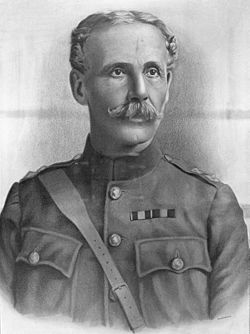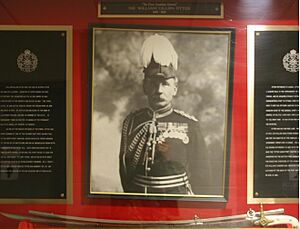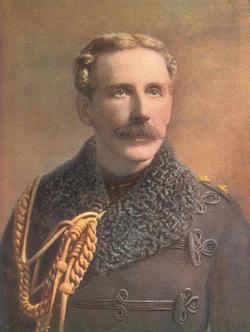William Dillon Otter facts for kids
Quick facts for kids
General
Sir William Dillon Otter
|
|
|---|---|

William Dillon Otter in 1900
|
|
| Born | December 3, 1843 The Corners, Canada West |
| Died | May 5, 1929 (aged 85) Toronto, Ontario |
| Allegiance | Canada |
| Service/ |
Canadian Militia |
| Years of service | 1866–1902 |
| Rank | General |
| Commands held | Chief of the General Staff Royal Canadian Regiment of Infantry |
| Battles/wars | Fenian Raids
|
| Awards | Knight Commander of the Order of the Bath Commander of the Royal Victorian Order Volunteer Officers' Decoration |
General Sir William Dillon Otter (born December 3, 1843 – died May 6, 1929) was a very important Canadian soldier. He was the first person born in Canada to become the Chief of the General Staff. This role meant he was the top leader of the Canadian Militia, which was Canada's army at the time.
Contents
William Otter's Military Journey
Otter was born near Clinton, Canada West. His parents, Anna Louisa and Alfred William Otter, were immigrants from England. William Otter started his military career in Toronto in 1864. He joined a part-time army group called the Non-Permanent Active Militia.
Early Battles and Leadership
In 1866, Captain William Otter was an Adjutant for the Queen's Own Rifles of Toronto. He first experienced combat with this group during the Fenian Raids. They fought in the Battle of Ridgeway.
In 1883, Canada created its first professional army unit. Otter joined this full-time army, known as the Permanent Force, as an infantry officer.
The Battle of Cut Knife
On May 2, 1885, Otter led over 300 Canadian soldiers in the Battle of Cut Knife. They fought against a camp of Cree and Assiniboine people. These groups were led by Poundmaker and Fine-Day. Otter's battle plans were not very effective against the defending warriors.
In 1893, he became the first leader of the Royal Canadian Regiment of Infantry. This was a big step in his career.
Serving in the Boer War
During the Second Boer War, Otter was a lieutenant colonel. He commanded a special Canadian battalion in South Africa. Many British officers thought his soldiers were the best infantry unit there. Otter played a key role in the Battle of Paardeberg.
Leading Canada's Military
In 1908, William Otter became the first Canadian-born officer to command Canada's entire military. He retired in 1910 as a major general. Later, in 1922, he was promoted to a full general. He was only the second Canadian to reach this high rank. Otter was known for being strict, because he wanted the young Canadian Army to be as good as the British troops.
Writing a Guide for Soldiers
In 1914, he wrote a book called The Guide: A Manual for the Canadian Militia. This book helped soldiers learn about discipline, duties, and how to behave in the army.
World War I and Beyond
During the First World War, Otter came out of retirement. He was put in charge of operations for the internment of enemy nationals living in Canada. This meant he oversaw where people from enemy countries were held.
Otter also led the Otter Commission. This group's job was to connect the units of the Canadian Expeditionary Force (CEF) from World War I to the existing Canadian Militia units. This work made sure that the brave actions and battle honors of the CEF were remembered and carried on by today's Canadian Army units.
General Sir William Otter passed away on May 6, 1929.
Otter's Legacy and Honors
Freemasonry Connection
Otter joined a group called the Ionic Lodge of Freemasonry in Toronto in 1869. He became a leader in this group in 1873.
Remembering William Otter

At the Royal Military College of Canada in Kingston, Ontario, there is a group of cadets called Otter Squadron. It was named in his honor. The leader of Otter Squadron is allowed to carry his sword during their graduation parade.
Family Ties
William Otter was the grandfather of a well-known Canadian military historian, Desmond Morton.
Awards and Recognition
Otter received many important awards for his service:
- Order of the Bath - Knight Commander
- Royal Victorian Order - Commander
- Canada General Service Medal - for the Fenian Raids in 1866 and 1870
- North West Canada Medal - for the North-West Rebellion in Saskatchewan
- Queen's South Africa Medal - for battles like Paardeberg during the Second Boer War
- King Edward VII Coronation Medal
- Volunteer Officers' Decoration
 | William Lucy |
 | Charles Hayes |
 | Cleveland Robinson |


